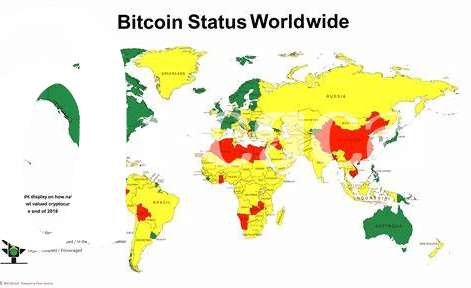Overview of Bitcoin and Money Laundering Risks 💰

Bitcoin, the renowned digital currency, has revolutionized the financial landscape, offering unparalleled speed and convenience in transactions. However, its anonymity and decentralized nature also pose significant challenges in combating money laundering activities. The lack of central oversight presents an attractive opportunity for illicit actors to obscure the origins of funds, facilitating criminal activities undetected. Understanding these risks is crucial in developing effective countermeasures to safeguard the integrity of financial systems and prevent exploitation by nefarious individuals seeking to exploit the vulnerabilities of this innovative technology.
Regulatory Framework in Germany 🇩🇪
Germany’s approach to regulating Bitcoin involves a comprehensive legal framework that aims to address the risks associated with money laundering. This framework includes guidelines and requirements for cryptocurrency exchanges and custodial services to adhere to stringent anti-money laundering (AML) and know your customer (KYC) regulations. These regulations are designed to enhance transparency and accountability within the cryptocurrency sector, ensuring that illicit activities are promptly identified and mitigated. Germany’s regulatory framework also emphasizes cooperation between regulatory authorities and financial institutions to strengthen the oversight and enforcement of these regulations. By establishing clear guidelines and requirements, Germany is actively working towards creating a secure and compliant environment for Bitcoin transactions within its jurisdiction.
Challenges Faced by Authorities in Detection 🕵️♂️

Facing the complexities of the digital landscape, authorities in Germany encounter significant challenges in identifying and combatting money laundering activities involving Bitcoin. The decentralized nature of cryptocurrencies, such as Bitcoin, poses a hurdle for traditional regulatory bodies. Tracking transactions on the blockchain to pinpoint illicit activities requires advanced technological capabilities and expertise. Moreover, the anonymity offered by Bitcoin transactions adds another layer of difficulty for authorities to trace the origin and destination of funds involved in potential money laundering schemes. As Bitcoin transactions are pseudo-anonymous and can be conducted globally with ease, detecting and monitoring suspicious activities becomes a formidable task for law enforcement agencies and financial regulators.
Impact on Financial Institutions and Businesses 💼

Financial institutions and businesses in Germany face significant challenges when it comes to the impact of money laundering with Bitcoin. The decentralized nature of cryptocurrencies like Bitcoin makes it difficult for traditional financial institutions to monitor and track illicit transactions effectively. This poses a serious risk to the integrity of the financial system and can result in reputational damage, regulatory fines, and potential legal consequences. To navigate these challenges, businesses must enhance their compliance measures and work closely with regulators to detect and prevent money laundering activities effectively. For more insights on the legal consequences of Bitcoin transactions, especially in France, you can check out this article on legal consequences of bitcoin transactions in France.
Case Studies of Money Laundering with Bitcoin 📉
Bitcoin has been increasingly used as a tool for money laundering, posing significant risks in Germany. Numerous cases have surfaced where illicit funds were funneled through the cryptocurrency, making it challenging for authorities to track and prevent such activities. These case studies highlight the intricate methods employed by money launderers to exploit the anonymity and decentralized nature of Bitcoin for their illegal transactions. From using mixers to obfuscate the source of funds to leveraging dark web marketplaces for illicit exchanges, these instances shed light on the evolving landscape of financial crime in the digital age. The complexity and cross-border nature of these schemes further complicate the efforts of law enforcement agencies in combating money laundering activities involving Bitcoin.
In response to these challenges, regulatory bodies and financial institutions have intensified their efforts to implement stringent measures to detect and prevent money laundering through Bitcoin. Collaborative strategies, technological advancements, and enhanced due diligence processes are being employed to stay ahead of sophisticated techniques employed by criminals. However, with the constant evolution of technology and financial practices, it remains crucial for authorities to adapt and enhance their capabilities to effectively combat the risks associated with money laundering using Bitcoin. The case studies serve as a stark reminder of the importance of ongoing vigilance and proactive measures in safeguarding the integrity of the financial system against illicit activities.
Mitigation Strategies and Future Outlook 🔒

Mitigation Strategies for combating money laundering risks associated with Bitcoin involve a multi-faceted approach. Enhanced due diligence procedures, robust Know Your Customer (KYC) practices, and implementing transaction monitoring systems are crucial steps to detect and prevent illicit activities. Collaboration between financial institutions, regulators, and law enforcement authorities is essential to strengthen the overall anti-money laundering (AML) framework. Moreover, raising awareness among stakeholders about the evolving nature of cryptocurrency-related risks is imperative to stay ahead of potential threats.
Looking towards the future, advancements in technology, such as blockchain analytics and artificial intelligence, offer promising tools for improving transaction monitoring and anomaly detection capabilities. Regulatory bodies are likely to continue refining AML regulations specific to cryptocurrencies to adapt to the changing landscape. By staying proactive and leveraging innovative solutions, the financial industry can enhance its resilience against money laundering risks associated with Bitcoin transactions.
Insert a link to legal consequences of Bitcoin transactions in Ethiopia with the anchor legal consequences of Bitcoin transactions in Fiji using the markup.
